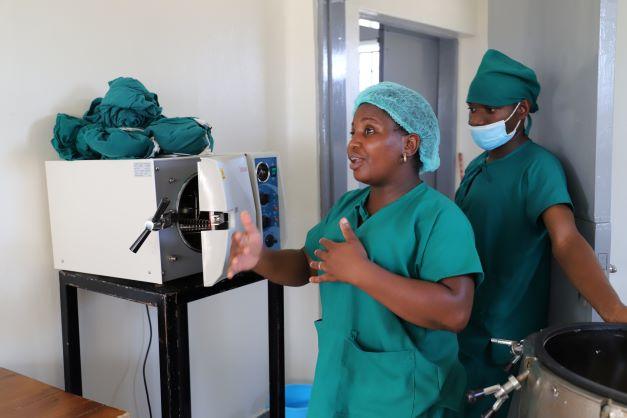Uganda: Regional maintenance team builds capacity of health workers at lower health facilities
For a health facility to provide
all-round quality services, they should have in place the right equipment
functioning optimally. For this reason, to promote appropriate use, regular
repair is critical to increase lifespan, decrease break downs as well as reduce
losses and wastages. The Regional maintenance teams are required to provide
routine maintenance and backstopping of equipment at health Centre IVs, and
with the ongoing implementation of the Belgian supported Leveraging Strategic
Health Financing for Universal Health (LSF) project, this support has been
extended to even HC IIIs in the region.
This preventive and curative
maintenance of equipment requires the team at the regional hospital to make
regular visits to health centre IVs and IIIs, as they provide training to
health workers to be able handle basic equipment. Robin Barugahare, the User
trainer based at the Fort Portal Regional Referral Hospital affirms.
This is because most of the
equipment faults at HCIVs are due to lack of skills especially on how to
operate the machines, use and maintenance. Sometimes they claim a machine is
not working and yet it is because they are not maintaining/handling them and
sometimes using wrong cable/incompatible cables. Robin Barugahare confirms “we
demonstrate basic skills to maintain basic equipment like an oxygen
concentrator and how to set an incubator. Sometimes when the vacuum is not
connected or the cable not fixed well, it may fail to function.
To confirm the above, the
Kyarusozi HC IV, Dr. Ruteganya, the In-Charge says they received 20 oxygen
cylinders from NMS, and because they did not know how to operate them, they
stayed in the store for 3 months before using them. On top of that they did not
know how to fix the stabiliser for a mere lack of a plier to fix it until the
team from the regional referral came to demonstrate how to fix it.
Bagaya Shamilah, a nurse at
Kyarusozi HC IV also relates that until the regional maintenance team
demonstrated to them how to set temperature limits and connect the stabilisers
on oxygen concentrators, they used to refer babies to Kyenjojo hospital because
they did not know how to operate NICU equipment. Karungi Christine, Enrolled
Nurse Kyarusozi HC IV confirms, now we are confidently using the oxygen
concentrators and we can fix cylinder with a cylinder head.
Sometimes it is to do with not
knowing the correct use but when the maintenance teams show health workers the
proper use, health workers confirm improved use. Some health workers openly
share that they did not know that some machines use distilled water as
confirmed by, Dr, Kayiri Joy Fred In-Charge
Rukoki HCIV When we got the autoclave, we did not know it uses distilled
water and for us we were using normal water until we were told and now it works
well.
Basic training in repairing/operating equipment, proves a multiplier
effect to health facilities
When the regional teams travel to
carry out preventing repair maintenance, it is now a norm they do on-spot
intentional training to health workers. This is proving to have a multiplier
effect, first of all there is no delay/denial thus continuity of a service
delivery to communities but also the health worker is learning a lifelong
skill.
Health workers can now testify
that they are able to fix simple basic faults and maintain constant running of
facility equipment. Allan Turyahabwe Theatre in charge Kyenjojo General
Hospital testifies, there a time we had a challenge with a cylinder head and we
did not know how to use it, so we were taught how to use it right. He says he can
easily fix it and continue with autoclaving. I am able to regulate the flow of
power, I can tell when it’s too much heat and reduce it. At times you can tell
when the steam is escaping, there we stop the process and start again.
Mbabazi Doreen, In-charge NICU
Bwera hospital I am able to operate an oxygen concentrator, regulate the
temperature and in-case it gets a fault, I can easily switch from the
concentrator to the cylinder. When the monitor reads no oxygen flow, I can tell
and fix it
I can work well with
sterilizers/oxygen concentrators. The regional maintenance team found our
concentrators dirty and non-functional. They also taught me that I need to
replace water for every patient Sr. Akugizibwe Hannah – In Charge Maternity
Ward, Bundibugyo General Hospital.
Health workers can now fix/solve
minor equipment technical hitches thus able to continue with providing services
and reducing fatalities. I can now fix an oxygen concentrator. I can also fix
an oxygen cylinder and the cylinder head as well as measure the amount of
oxygen to administer, sometimes we receive mothers with foetal distress and I
am able to administer oxygen and save that baby’s life reminisces Teddy
Kabatooro, Kenjojo Hospital.
Latest news from this project
No news

